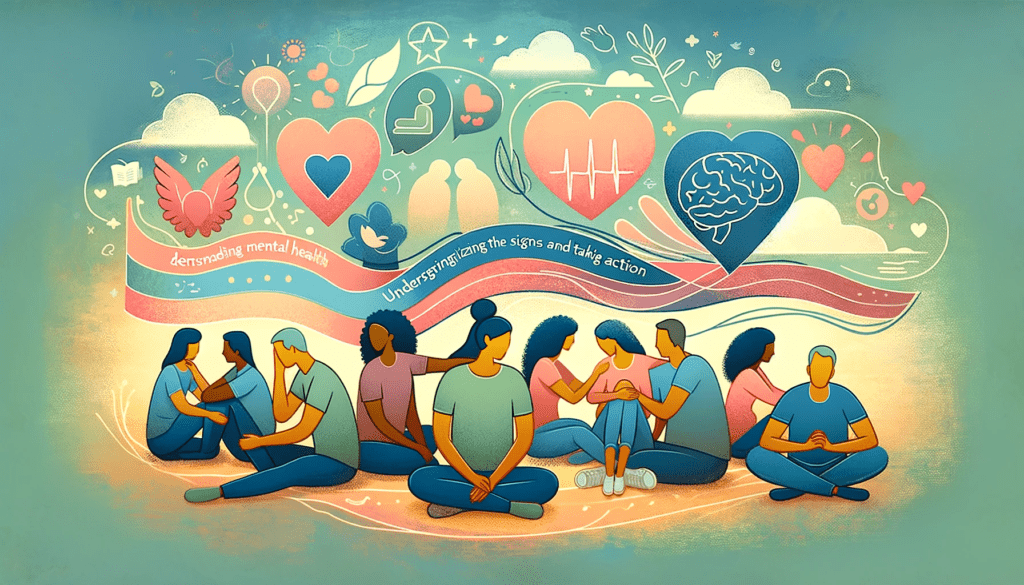Mental health is an integral part of our overall well-being. It influences how we think, feel, and act in our daily lives. Recognizing the signs of mental illness in ourselves or our loved ones can be challenging but is a crucial step towards seeking help and support. If you suspect that you or someone you care about may be experiencing symptoms of a mental health condition, there are resources available to help you take the first step towards understanding and addressing these issues.
Common Signs of Mental Illness
Mental health conditions can manifest in various ways, and the symptoms can be different for each individual. Here are some common signs that may indicate a mental health issue:
- Persistent Sadness or Low Mood: Feeling down, hopeless, or experiencing a loss of interest in activities once enjoyed.
- Excessive Worry or Anxiety: Constantly feeling anxious, worried, or overwhelmed by stress.
- Mood Swings: Extreme changes in mood, energy levels, or behavior.
- Withdrawal: Isolating from friends, family, or social activities.
- Changes in Sleep or Appetite: Experiencing significant changes in sleeping patterns or appetite.
- Substance Use: Increased use of alcohol or drugs as a way to cope with emotions.
- Difficulty Concentrating: Trouble focusing, remembering, or making decisions.
- Unexplained Physical Ailments: Physical symptoms without a clear cause, such as headaches, stomach aches, or chronic pain.
- Thoughts of Self-Harm or Suicide: Having thoughts about harming oneself or ending one’s life.
If you or someone you know is experiencing any of these symptoms, it’s essential to consider taking a mental health screening.
Take the First Step: Free, Quick, and Confidential Screening
Identifying mental health issues early can make a significant difference in managing and treating these conditions. A great first step is to visit www.mhascreening.org. This resource offers a variety of free, quick, and confidential screening tools for:
- Depression
- Bipolar Disorder
- Anxiety
- Post-Traumatic Stress Disorder (PTSD)
- Alcohol or Substance Use Problems
These screenings are designed to help you understand your mental health better and provide you with information on the next steps you can take. The results can guide you in seeking professional help or support from loved ones.
Why Screenings Matter
Mental health screenings are crucial because they:
- Provide Clarity: Help you identify whether your symptoms are related to a mental health condition.
- Encourage Early Intervention: Early identification of mental health issues can lead to more effective treatment and better outcomes.
- Reduce Stigma: Normalizing mental health screenings can help reduce the stigma associated with mental health conditions.
- Empower Individuals: Give you the information needed to take control of your mental health and seek appropriate help.
Seeking Professional Help
If your screening results indicate that you may be experiencing a mental health condition, it’s important to consult with a healthcare professional. They can provide a comprehensive evaluation and discuss treatment options that may include therapy, medication, lifestyle changes, or a combination of these.
Supporting a Loved One
If you believe a loved one may be struggling with their mental health, approach the situation with compassion and understanding. Encourage them to take a screening and offer to support them in seeking professional help. Listening without judgment and being there for them can make a significant difference in their journey towards mental wellness.
Conclusion
Taking care of our mental health is just as important as taking care of our physical health. If you or a loved one may be experiencing signs of a mental illness, don’t hesitate to take advantage of the free, quick, and confidential screening tools available at www.mhascreening.org. Remember, seeking help is a sign of strength, and there are resources and support available to guide you towards better mental health.
For more information and support, visit our website or contact our foundation directly. We are here to help you every step of the way.







